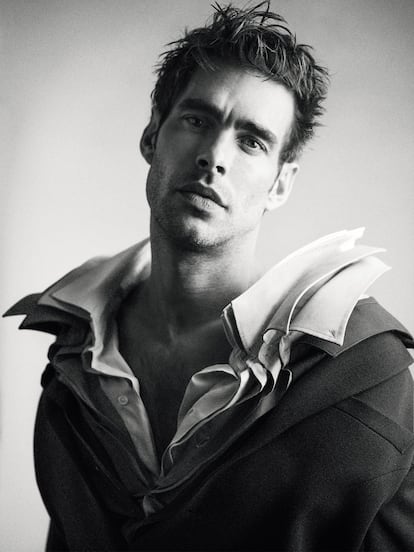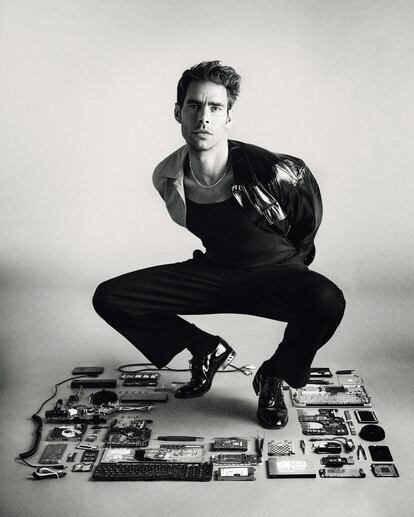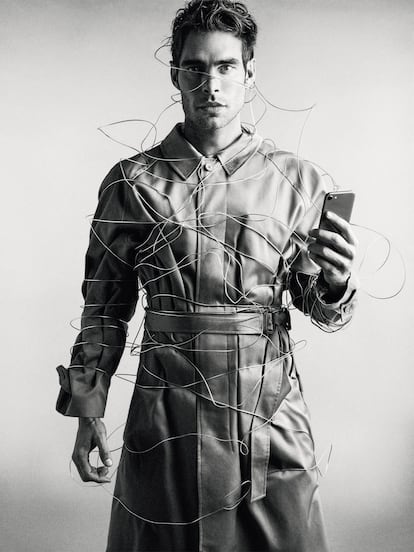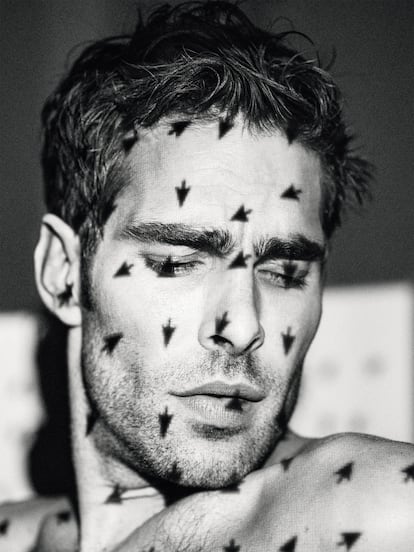Jon Kortajarena: ‘I’m an imperfect ecologist. I do what I can. Of course, I do it poorly sometimes, but that’s better than not doing anything at all’
He’s been working towards responsible consumption for 10 years. Al Gore’s foundation gave him a prize for it. Now, he’s embarking on a new fight against the dictatorship of the new

Jon Kortajarena (Bilbao, 38 years old) repeats various times during the conversation that “we don’t have time”. He’s referring to the rapid approach of 2030, the year in which the United Nations says that the consequences of climate change will become irreversible. “But, really, there are small acts that don’t cost anything, but that can help to make big changes,” he says. The actor and model’s followers, which number more than three million, are more than used to seeing him pick up plastic on the beaches of Basque Country, carry Greenpeace protest signs and travel to Vanuatu, an archipelago near Australia “from which people have already had to flee. They are climate refugees. And that is something that will soon be common if we don’t try to find solutions,” he says. He’s more than used to receiving criticism, “and I know I could post prettier or nicer things to social media, but I feel responsible because I have a platform and truly, I’m doing this from the heart. I don’t care about the rest.”

His commitment to the climate cause began more than 10 years ago. “It was because of my aunt. She works in a local supermarket, and they began to realize how much trash they were creating and decided to start taking small steps, like selling bulk products and recycling packaging,” he remembers. “Little by little, I also began to recycle and to think about what I did and didn’t buy.” During that time, he started volunteering with Al Gore’s non-profit, The Climate Reality Project, with which he traveled to areas that have been affected by climate change. In 2019, he received an award from the organization for his work as an activist, “even though I don’t consider myself one. I’m not an expert, but I’ve traveled to places where natural disasters have taken place and I’ve seen the effects of global warming, although in reality, we’re seeing them every day. I simply listen to those who do know, activists and scientists. The information is there and it’s incredible how many people look the other way,” he says.

Kortajarena practices what he calls “imperfect ecologism”: “I mean, I do what I can. Of course, I do it poorly sometimes, but that’s better than not doing anything at all. For example, for my work I have to take a lot of flights, so I’m going to do that, but if I work within Spain, I always ask to go by train,” he says. “And that extends to any small act. I know that many people can’t always consume in a completely sustainable way, but there’s always small choices that, when they become a collective choice, help. Each of us can do what we can, given our possibilities.” A while ago, despite his work in fashion, he began to consume less: “They have taught us to consume, even that it’s cheaper to throw clothes out than repair them, the same with telephones and other appliances. What a lot of people don’t know is that, for example, last year in Spain they passed laws that force manufacturers to repair their products for up to 10 years after you buy them, or at least provide repair tools. They don’t know because manufacturers don’t want to do that.” He is conscious that “governments have to act.” He sent a letter four years ago to Spanish Prime Minister Pedro Sánchez expressing his concern, to which Sánchez responded, saying that the issue also worried him, “and that this year some key laws are going to put into place, like one that forces companies to take care of the ecological management of their own surplus merchandise. But more are needed. Above all, information is needed. People are taught to consume, but many do not know what happens when they consume rampantly, or how some things are made. The other day, I learned about ultra-fast fashion, and it gave me goosebumps,” he says.

Kortajarena’s fight against the dictatorship of the new has led him to become an ambassador for Wallapop, Spain’s biggest resale site. He himself got involved with the brand’s creative agency to develop the idea for its latest campaign. “We thought that making a personal appeal was the right way to raise awareness,” he says. Ultimately, they decided to show home videos from his childhood, and other clips that he had saved on his phone from work trips. “I appear at the end, because the idea is that it could be anyone’s childhood. We are all born in a bed that others have used, when we go to restaurants, we eat with cutlery that others have used, we live in houses where others have lived, we sleep in hotels with sheets that others have used. Why shouldn’t we wear clothes that others have used? I usually buy secondhand, and besides finding incredible things, if the clothes have gotten this far in perfect condition, you can be sure that they are of good quality,” he says, confessing that this is one of the few times he has become the face of a campaign “for something that is really needed.”

According to the Hot or Cool Institute, which is dedicated to measuring the impact of society’s consumption of fashion, we should be only buying five new garments a year. “It’s not about not buying, but knowing what it is that we’re buying. If we all thought twice about what and how we buy, companies would have to change the way they do things,” Kortajarena says.
Sign up for our weekly newsletter to get more English-language news coverage from EL PAÍS USA Edition
Tu suscripción se está usando en otro dispositivo
¿Quieres añadir otro usuario a tu suscripción?
Si continúas leyendo en este dispositivo, no se podrá leer en el otro.
FlechaTu suscripción se está usando en otro dispositivo y solo puedes acceder a EL PAÍS desde un dispositivo a la vez.
Si quieres compartir tu cuenta, cambia tu suscripción a la modalidad Premium, así podrás añadir otro usuario. Cada uno accederá con su propia cuenta de email, lo que os permitirá personalizar vuestra experiencia en EL PAÍS.
¿Tienes una suscripción de empresa? Accede aquí para contratar más cuentas.
En el caso de no saber quién está usando tu cuenta, te recomendamos cambiar tu contraseña aquí.
Si decides continuar compartiendo tu cuenta, este mensaje se mostrará en tu dispositivo y en el de la otra persona que está usando tu cuenta de forma indefinida, afectando a tu experiencia de lectura. Puedes consultar aquí los términos y condiciones de la suscripción digital.









































